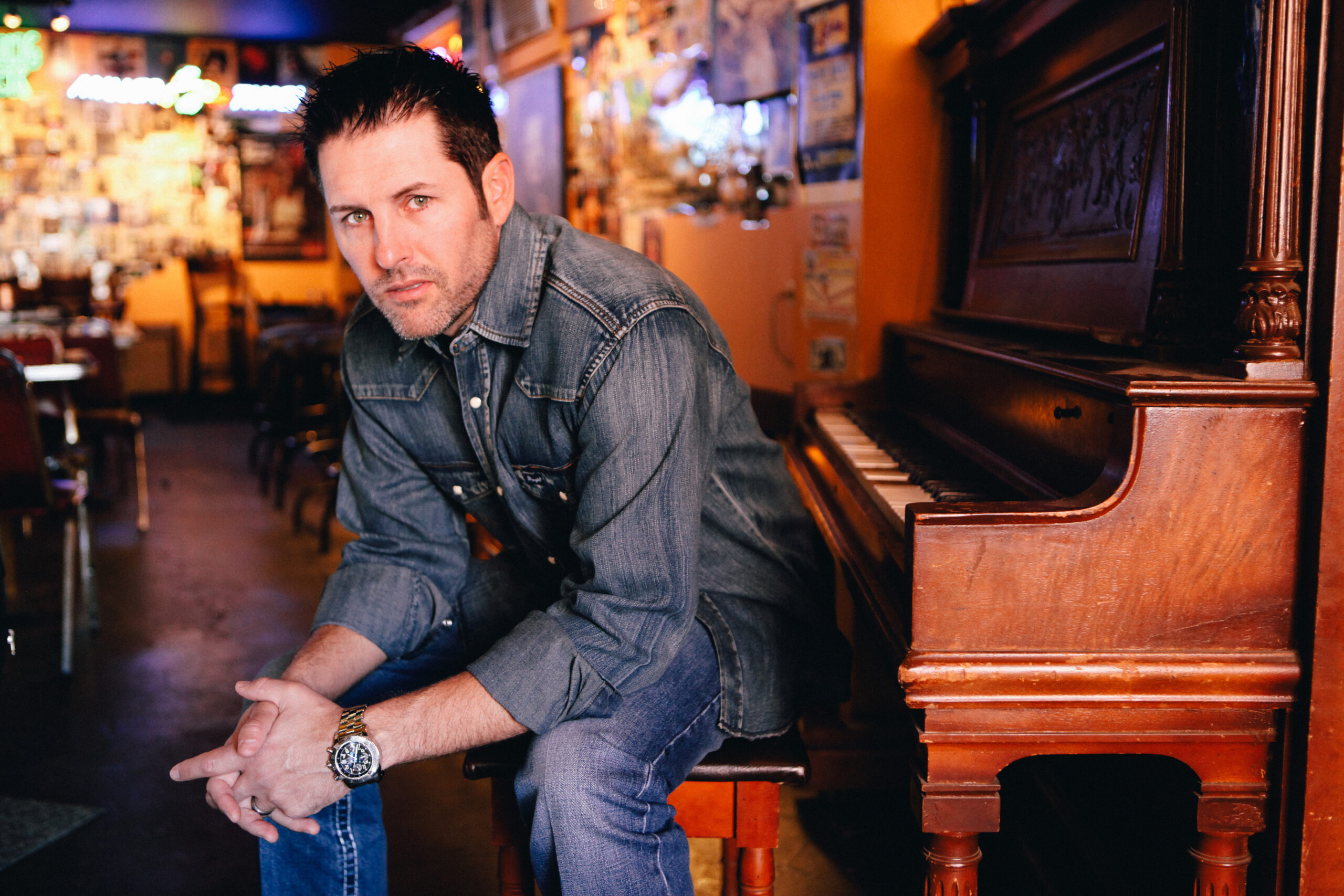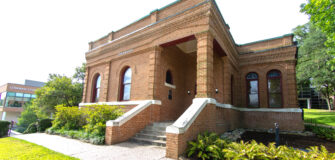
CD: She stalked me. She wouldn’t leave me alone. No, really, I came home from A&M, and she was the new girl in town; we were at a party at my buddy’s house. I really couldn’t play the guitar at all then, but I think I was playing on a tailgate, and she was mesmerized. From that moment forward, she couldn’t get me out of her head.
MD: That’s not even the truth! He didn’t even introduce himself that night. Fast-forward to the next summer. I had just graduated high school, and my current boyfriend’s roommate and Casey were friends. So that’s how we met.
CD: Yeah, A&M was restructuring some of their classes and there was a downsizing, so some of us had to leave A&M. My grades weren’t exactly up to par, so I moved home. I think I have like an honorary degree coming or something. It’s lost in the mail. So, I moved home, and she broke up with her boyfriend. We saw each other in the stockyards, and I asked her to dance.
MD: He had on khaki pants and a white button-down shirt…like a nerdy outfit. He followed me for six weeks, and then I finally went on a date with him.
MD: We’re total opposites, so it was easy. Casey is very laidback. He kind of just goes with the flow. I’m loud, very organized, and have OCD.
CD: She’s super organized, super on top of things, and very determined. I’m more of a free spirit.
CD: We’ve got a fourteen-year-old, Zane River, and a nine-year-old, Zax Ryder. Pretty different kids. Our oldest…
MD: Acts just like Casey.
CD: Yeah, he’s got a little me in him for sure. They’re both super sports kids, super outdoorsmen, hunters. They’re rad kids for sure. They’re crazy smart. My oldest is kind of like Rain Man. He’s doing things on another level. He’s taught himself how to play the drums, piano, and guitar. He plays every sport there is. He wakes up at 5:30 in the morning and works out every day before school. I don’t know of any other eighth grader in the universe who wakes up at 5:30 to work out. And then the little one is like the sweetest human being on the planet–unless he’s on a baseball field; then, he’ll take your head right off your shoulders.
I know they keep you both very busy. Not sure how you balance it all with such a successful music career. Let’s jump into the music. Melinda, you began managing Casey early on. Casey, when did you realize you were good enough to pursue a living in country music?
CD: It was a hobby at first. My grandpa played guitar, and I taught myself how to play in college. Being a storyteller has always been my passion. We started in 2002, very casual, across the street at a bar that’s now a tattoo shop. It was the Thirsty Armadillo. Back then, it was kind of the spot in Fort Worth if you couldn’t play Billy Bob’s – you played there or at Woody’s. I don’t think we ever set out for this to be a career. We both still had other jobs for the first six years of this.
CD: No one would let us open. No one cared. So, we did everything on our own. We would play places that no one else played – rock bars in Abilene on Tuesday nights. Because they would just let you come in and play for the door.
MD: And sometimes we played for free bar tabs.
CD: It was one of those things where we’d get through a year, then decide to do one more year. Let’s see what happens in a year. And then, all of the sudden, you’re making money. In 2008, we just decided to both do this for a living. We both quit doing anything else and dove into this.
MD: It was probably the biggest thing. I think where a lot of bands or musicians fail is they can’t invest in themselves. Because, when you first start, you’re not selling tickets. You’re not really making much, and you’ve got to pay everyone in your band and put gas in your car.
CD: When I first started, if you told me 300 people were going to be there for sure, I would play for free. My thought was, ‘I’m going to sell 300 people on me, and if I can sell $300 of t-shirts, I can pay my band $100 apiece.’ That was all I cared about. I didn’t really need to make the money, because I had a job. A lot of young artists today don’t see it like that, but you have to invest in yourself.
MD: Because if you’re getting everyone else to invest in you, it’s like you’re constantly owing everybody something. You always have a debt to pay.
CD: I think one of our biggest things was our merch. I think we were advanced, merchandising-wise. You would go to places and see Casey Donahew shirts. My name or lyrics were huge across the back of the shirt, with bright colors – kind of trashy chic. It was big and bold. We sold our shirts for $10 forever, when everyone else was selling them for $20 and $25. Part of that is because we could invest in ourselves. Also, my wife’s my manager, so I’m not having to kick 15% out to somebody else.
CD: I give a lot of credit to MySpace. That’s right when we started. We’d put music on there, and everybody was on it. We were getting these crazy numbers and, also, we came along at the time of burning CDs. Like a “worn out tape of Chris LeDoux” – that was a thing with rodeo kids. Rodeo kids would burn CDs, then meet at rodeos and trade burnt CDs. We would get contacts from crazy places because of all the rodeo songs.
MD: Then when iTunes started, you could go in independently and upload your music as a third-party. It was great, because we could finally get music on something. Until then, being independent, the only thing we could do was consignments with Hastings back in the day, like in college towns. So, all of a sudden we get a couple songs on iTunes, and we start getting these checks in the mail. Casey was like, “Is this real? Can we cash this? What is happening?”
MD: Not sleeping in the van. We did a lot of van sleeping.
CD: 2008 was the first year we made a lot of money. But half of the shows we did that year were for $100. We would sleep in a van, freezing cold, not running. So many miserable nights. I can’t even comprehend it.
MD: It was like Almost Famous, but not glamorous. At all.
CD: And back in those days, there was a big deal about this trailer-stealing crisis. So, when we’d stay at hotels, I couldn’t sleep. We couldn’t afford to have everything we owned stolen.
CD: “Bad Guy” is one I’m really proud of; I wrote it by myself. “Drove Me to the Whiskey,” too. I don’t spend a lot of time writing with other people. There are people I do write with that I really enjoy, but the old Nashville writing process isn’t my thing. But there are different kinds of songs. I think early on, I caught a lot of flak for the simple songs. I like fun songs, funny songs, and clever songs.
CD: To me, it feels like a traditional country song, in a time when that doesn’t seem as popular as it used to be. It still has some appeal to people. That’s one of the things that jumps out to me – it’s a grab-your-girl, hit-the-floor-and-two-step, dancing country song. I wrote it with Tim Nichols and Josh Leo.
CD: There may be another single off “Built Different,” but I have a lot of songs to go into the studio with and am really excited about the new stuff.
CD: Melinda was capable and stepped into a prominent role in my career; there is nothing more valuable than having someone who has nothing but your best interest in their mind.
CD: When we started, somebody told me this, and I have tried to stick with it for 20 years – do everything you can yourself until you can’t do it anymore. You don’t need anyone taking any of your money for things you can do yourself.
Great advice! Thank you, Casey and Melinda Donahew, for sharing your story. To learn more about Casey’s music and to see his up-to-date touring schedule, visit caseydonahew.com.

Postcards Magazine
936-293-1188
PO Box 690
Huntsville, TX 77342
